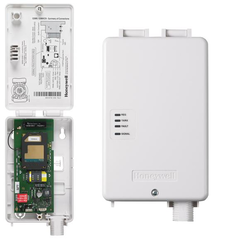As the sunset for 3G cellular networks is quickly approaching, Alarm Grid has some important news regarding support for Verizon's 3G CDMA network. This news affects both the Alarm.com service and Honeywell's AlarmNet server.
As of today, June 1st, 2018, Verizon will no longer activate Alarm.com CDMA cellular communicator SIM cards as they prepare for their CDMA network sunset. If the Verizon SIM card is already activated, which is done during manufacturing, Alarm.com will still allow the account activation to go through.
However, if a communicator is manufactured and never activated with Alarm.com, or if it's activated with Alarm.com but then cancelled, the Verizon SIM will eventually become deactivated. Therefore, it's possible that a CDMA module you already have won't be able to be used if it's not currently active with Alarm.com.
If you have an existing Alarm.com CDMA communicator with a different monitoring company, it can still be "recycled" and brought over to a new alarm company, as long as the communicator is re-activated with the new monitoring company soon after it's cancelled by the existing monitoring company.
Any existing Alarm.com CDMA communicator that is already active with Alarm.com will continue to work for the time being, but will be sunsetting soon.
If you need to purchase a new cellular communicator for an Alarm.com panel, we recommend one of the following Verizon LTE options:
For 2GIG GC3:
For more information on GC3 Firmware Updates, please click here. Also see this guide to upgrade the GC3 communicator.
For 2GIG GC2:
For more information on GC2 Firmware Updates, please click here. Also see this guide to upgrade the GC2 communicator. You can also review the FAQs 2GIG GC2 Firmware Update Instructions Using UPCBL2 and How to Upgrade GC2 Firmware Using a Cable for more information.

Starting June 30th, 2018, Honeywell AlarmNet CDMA cellular communicators that were manufactured before March 1st, 2018 can no longer be activated. If you have an AlarmNet CDMA communicator that was manufactured before this date, you must activate it by June 30th.
At that time, it will also be impossible to bring a Honeywell CDMA radio from one monitoring company to another. AlarmNet CDMA communicators that were manufactured after March 1st, 2018 can be activated until December 22nd, 2018. Any AlarmNet CDMA communicator that has already been activated will continue to work until the CDMA network is shutdown.
If you need to purchase a new cellular communicator for a Honeywell Alarm System, we suggest buying an LTE module. Alarm Grid recommends the following options based on system type:
Honeywell Lyric Controller: LYRICLTE-V supports Verizon LTE
Honeywell L5210 and L7000 (Firmware 9+): LTE-L57V supports Verizon LTE
Honeywell VISTA Systems: LTE-XV supports Verizon LTE or LTE-IV supports Verizon LTE & IP

Additionally, if you have a CDMA communicator that has not been activated, you will no longer be able to return it to Alarm Grid for a refund. We will not be taking any CDMA returns as of today. Our company stopped selling CDMA communicators roughly three months ago, and we have been preparing for the 3G sunset for quite some time.
Cellular service providers have already discontinued support for their 2G networks, and they are currently preparing to do the same for their 3G networks. This includes the Verizon 3G CDMA network. Instead, cellular service providers are shifting their focus to their newer and more advanced 4G and LTE networks. If you need to upgrade an alarm system to cellular, you should purchase an LTE module if possible.
Remember, existing CDMA communicators that have already been activated can still be used for the time being. These modules will continue to work until the CDMA network is discontinued. At that point, any CDMA cellular module will need to be replaced and upgraded to a newer communicator.
If you have any questions about this news, please send an email to support@alarmgrid.com. You may also call us at 888-818-7728 from 9am to 8pm EST M-F.
Edit (6/8/18): This blog post previously stated that as of June 1st, no Alarm.com CDMA module that wasn't currently active with Alarm.com service could be activated on a new Alarm.com account, which has changed since it was written. It has been edited to reflect the correct information.






